- Home
- Taylor Caldwell
Balance Wheel Page 5
Balance Wheel Read online
Page 5
The long twilight before the dark had set in, and Charles wondered whether or not he could reasonably order his carriage to be turned about and go home. But no, Jochen and Isabel were expecting him, though it was so late. There was nothing to do but to run in for three or four minutes, and then excuse himself. Jimmy was waiting for him. The boy would not eat his own supper until his father returned.
At least, Jochen’s house was not too far. Within five minutes, the carriage was rolling briskly down wide Beechwood Road, with its array of pretentious mansions set far back from the street. Though Andersburg had less than one hundred thousand population, it was an unusually wealthy city, and Beechwood Road had taken over the title of “Millionaires’ Row” from Schiller Road only a few short years ago. The houses here had a rich aura about them, surrounded as they were by long broad lawns and trees and gardens. Jochen’s house was one of the most ostentatious, built of rosy brick with white pillars in a style reminiscent of Southern architecture. It had a mellowed air, though it was only six years old. Isabel might be the daughter of a wealthy butcher (who had finally possessed a large slaughterhouse of his own), but she had taste. Wilhelm might have genuine antiques, and Isabel might have only their excellent reproductions, but at least one could sit on a loveseat or a chair without fear of its collapsing and without uneasily hearing ominous creaks under one. The oriental rugs might not be more than thirty years old, but they had a genuine lustre about them, and no frayed edges, and no delicate repairs. All in all, Charles preferred Jochen’s house to Wilhem’s. One could tire very easily of beautiful fragility, but one never tired of beautiful, sturdy warmth, even if books were never in evidence, or one painting of real worth.
The last sunlight touched the top of the high and ancient elms and chestnuts along the street, and rippled faintly on the slate roofs of the great houses, Here and there a lamp or two began to shine through shrubbery. Yes, it was late. He’d stay three minutes only. Charles felt some regret. His brother Jochen had a fine cook, and Isabel never served tea or sherry. Excellent coffee would always be produced, and a plate of marvelous pastries, or, if Charles so signified, a Scotch and soda. Jochen lived largely and rapaciously. Wilhelm’s fine and exquisite home became ghostly in Charles’ thoughts, and Friederich’s repulsive house was happily forgotten.
The carriage rolled up the drive. A light shone through the wide and glittering north window. It was almost time for supper. Charles ran lightly up the shallow white steps of the house and rang the bell.
A crisp young maid admitted him, all black and white muslin. Yes, Mr. and Mrs. Wittmann were in the drawingroom. Isabel and Jochen were waiting for him. Isabel was working on some embroidery, and Jochen was reading one of his endless financial journals, and smoking one of his splendid cigars. The high crystal chandelier had been lighted, and it shone down on all the rich color below it and the well-placed furniture and the expensive Sarouk rugs.
“We’d given you up, Charlie,” said Jochen, dropping his papers, and flicking the ash from his cigar. He stood up, and stretched, crudely, and yawned. Isabel smiled at Charles. “You’re staying for supper, I hope,” she said. She extended her hand to him with a great-lady gesture, and he took it.
“Sorry, Isabel,” said Charles. “I was delayed. From the very beginning. I’m just staying a moment or two.”
“Scotch?” said Jochen.
“Thanks.” Charles sat down in a good, comfortable chair, a chair which Wilhelm would disdainfully have called “bastard Chippendale.”
“But make it a small one,” he added, hypocritically.
Jochen chuckled. He went to a tray on a distant table, where the seltzer stood, and the whiskey. Isabel watched her husband. “We had some very nice cakes,” she said. “But we sent them back. Would you like some, Charles?”
“Scotch and cakes?” shouted Jochen. He glanced over his big shoulder affectionately at his wife. “I’ll bet Charlie’s had all the weak tea and sour coffee and stale cake—or any cake, for that matter—that he wants in one day. Right, Charlie?”
“You’re right,” smiled Charles. He looked about him. He liked this large room, and its comfort, and its massive beauty, even if he did not like either Jochen or Isabel. He suspected, with good reason, that they did not like him either, and that he formed a solid part of their conversation with each other. He distrusted Jochen and his wife. He distrusted all hearty men, and he disliked women who gave themselves airs, and whose smiles were always gracious and sly.
He ought to have been ill at ease with these two, but he never was. He was never one for probing into his own emotions, so he did not probe now.
Jochen brought back two glasses which tinkled pleasantly. He gave one to Charles, and sat down with one in his own hand. “Cigar?” he asked. Charles accepted a cigar. There was no doubt of it: these two could make one feel at home, if one overlooked a number of things, such as knowing glances between husband and wife, and false smiles, and affected cordiality.
“Well, how’s our Willie, and our Fred?” asked Jochen. “I suppose you’ve made your rounds?”
“Willie’s all right, and Fred—well, Fred was not too bad today,” replied Charles, temperately.
Jochen and Isabel gave each other a quick look, and seemed amused. Charles concentrated on his drink.
“And how is dear Phyllis?” asked Isabel, with insincere interest
Charles was accustomed to these questions. He usually answered them automatically. But all at once, something in Isabel’s voice irritated him. He looked at her. “Prettier than ever,” he said. “But then, Phyllis was always a beautiful woman. Remember, Joe,” he went on, turning to his brother, “when Phyllis was considered the most beautiful girl in Andersburg?”
He knew, without looking again at Isabel, that he had annoyed her, and it pleased him. Jochen laughed. “You always thought so, didn’t you?” he said. “Well, I didn’t. I like body in women, and Phyllis hasn’t any. Not obviously, anyway.”
Charles put down his glass deliberately. He knew they were watching him. This was ridiculous, but he felt his heavy anger rising. He stared at the glass he had put down. It was that sherry, and the work he had had to do today, that was making something beat strongly in his chest. Damn them, he wasn’t going to let them stir up his liver. He looked at his brother, who was watching him with a wide smile.
Jochen, vice-president of the Wittmann Machine Tool Company, was thirty-six, three years younger than Charles. But he was a bigger man, and was “going to fat,” and his brown hair was thinning noticeably. He had the Wittmann broad face, but it was broader than Charles’, and his small brown eyes were even smaller, so that at times they appeared hardly more than beads between his thick lids. He had a very high color, which could become apoplectic, and his full Wittmann mouth had a certain brutishness about it. His large and prominent nose had a reddish tinge, for Jochen loved liquor and good food in unrestricted quantities. He had thick ears, unlike those of any of his brothers, and they flared from his big round head, and were almost as red as his nose. He dressed well, though his clothing just escaped being loud, in Charles’ opinion, and he had a clean look in spite of his bulk.
For a few moments, Charles disliked Jochen almost as much as he disliked Friederich. It was queer; he could not put a finger on it. But there it was: Jochen reminded him of Friederich in some obscure way, though Friederich was all fanaticism and Jochen all expediency. Charles paused, and considered. Could it be that fanaticism and expediency were identical traits?
Charles became aware of the fact that Isabel had been speaking to him. He wanted to say, rudely: “What?” But he was never rude with women, even when he disliked them immensely. So he just listened closely, and tried to discover what she had been saying.
“But, of course, Phyllis was never very robust,” Isabel concluded. Charles gathered that she had been remarking on Phyllis’ recent appearance.
“She couldn’t be presenting Willie with an heir at this late date, could she?” asked Jochen,
following his words up with a loud laugh.
Charles remembered that Isabel was nearly two years older than Phyllis, so he said: “Hardly. Too old for that. Wouldn’t you say, Isabel?”
“Not too old, certainly,” replied Isabel, and in so stiff a voice that Charles was pleased again. “After all, she’s only a year younger than myself. Thirty-four, isn’t she?”
Her vexation was evident, and this amused Jochen so that he laughed again. She directed a hard glance at him, and his laughter stopped. Charles was even more pleased. He picked up his glass again.
“Two years younger,” said Jochen, punishing his wife. “You’re thirty-six, Isabel. Never mind. You’re the prettiest woman in Andersburg, in my opinion, Sweet; so don’t glare.”
Isabel was indeed a comely woman. Even Charles admitted that. She was tall and had a full but graceful figure, which was the admiration of herself and her friends and Jochen, and she had very neat ankles which she frequently displayed, and very small feet exquisitely shod. She had a more slender face than one would expect in a woman of her proportions, and her complexion was all white and illusive pink. It was her boast that people frequently suspected her of “painting,” but art could not have reproduced those fine tints. Her features were good; she had full hazel eyes with sweeping lashes, a beautiful if somewhat narrow mouth, and a nose without fault. Her high-swept hair was thick and dark, coiled at the back and gleaming. It was strange that all these assets, good in themselves, could express a latent commonness, for not a single feature, taken singly, was coarse.
Charles did not like people who spoke of “good breeding.” He thought it precious. Yet all at once he was thinking that Isabel had no “breeding.” She was not a lady, and she would never be one, in spite of her dainty airs and her careful mannerisms and her assumed aristocracy. Her father, becoming well to do when she had been sixteen, had sent her to a finishing school in Philadelphia for two years. It had done no good at all, reflected Charles. There were even moments when Isabel forgot her grammar, and became entangled in syntax. But she had brought considerable money to Jochen, and Jochen loved her and admired her, and she had given him children, and it was apparent that she loved Jochen in return and admired him extravagantly. Charles had had it repeated to him, by friends, that Isabel felt it unfair that he, and not Jochen, was president of the Company.
Charles bore her no malice for this. It seemed right and proper to him that a wife should have a good opinion of her husband. So, it was not this that made him dislike her. In the past, his dislike had always been a passive thing; he wondered why it was suddenly active, tonight.
Isabel, forgetting her annoyance, and pleased at her husband’s compliment, gave him a gracious smile. She turned to Charles: “How is Jimmy?” she asked. “I haven’t seen him for a month, not since Geraldine’s birthday party.”
“Jimmy’s all right,” said Charles, his voice unconsciously warming, as it always did when his son was mentioned.
Jochen looked at his cigar. “The Bachs’ kid was telling Geraldine that he thought Jimmy had something on his mind lately. Isn’t as interested in football and track meets as he used to be. Well, kids grow up.”
Charles was provoked. He was about to reply, but was suddenly silent. Yes, there was “something” about Jimmy these last few months. He, Charles, had dismissed the thought with the easy explanation that Jimmy was becoming a man, and was changing into maturity. Then he recalled that he had often caught Jimmy’s quick look, which turned away at once. Charles was uneasy. It was not like Jimmy, who was so devoted to him, and who trusted him so implicitly, not to speak of everything to his father.
Then Charles said: “Boys grow up, as you say, Joe. Maybe he’s having his first attack of puppy love. I’ll hear about it, eventually, from him.”
He thought of Jochen’s three girls, Geraldine, May and Ethel. He did not like May and Ethel, who were pretentious and full of baseless snobbery like their mother, and who, even at fourteen and thirteen, were always careful to do the correct and socially acceptable thing. They also had Jochen’s malice and greed. Charles disliked their childish voices, affected and stilted. They, with their sister Geraldine, went to the best school for girls in Andersburg, and they made a special study of candidates for their friendship. Social climbers, like their mother, thought Charles. But in their climbing, like Isabel’s, they showed no taste. Fine girls of fine and distinguished families, if those families were not particularly wealthy, were quite ignored by May and Ethel.
However, this was not so with Geraldine, who was Charles’ favorite, and for whom he had a strong paternal affection. Geraldine might not be so pretty as May and Ethel, but she had a genuine ”air.” It came to Charles that Geraldine was considerably like her uncle Wilhelm, who, in an unguarded moment, had confessed that if he had ever had children he might have liked a girl like Geraldine. She was not, at sixteen, particularly interested in dress and fashion, for she was studious and grave. Yet Charles had often heard her laugh with Jimmy, and the laugh had been sweet and humorous.
Geraldine was a disappointment to her parents, for she was not socially ambitious. Yet, they were concerned about her. Charles knew, without ever having been conscious of a hint from Isabel or Jochen, that they hoped that Jimmy and Geraldine might marry some day. Certainly, they had reason for such hope, for Jimmy and Geraldine had been playmates all their lives, and Jimmy had recently said that Geraldine was the only girl he knew who had “sense.”
Thinking this, he said aloud: “Yes, probably just puppy love. He’s at the age for it.” He looked at his brother and Isabel. “I hope it’s Geraldine.”
They smiled at him at once, genuine smiles of pleasure, and so he knew he had been right. “Well, Gerry’s just a baby, but we’ll see in time, after she’s been at Wellesley.”
Isabel gave her husband a cold glance. “I wish you wouldn’t call her ‘Gerry,’ Jochen. Geraldine’s such a pretty name. I detest nicknames.”
Charles knew that the thrust was meant for him, also, so he deliberately said: “Well, I must go, Joe. You remember, Joe, that we’ve a meeting for Thursday, to discuss the sale of the river land. Think over my idea, Joe, of selling the land to the city. You wouldn’t want the Connington to get the land and ruin the waterfront, would you, Joe?”
Joe did not answer immediately, but his eyes glinted foxily. He’s thinking he’s got Willie and Fred, thought Charles. He waited innocently for Jochen’s reply.
Jochen coughed. “It isn’t so very important, Charlie. We’ll discuss it Thursday.” His manner was careless.
Then Jochen’s manner changed, became mean and domineering: “I wanted you to come earlier, Charlie, for a private chat. I’ll have to be as quick as possible now, I suppose, Why are you keeping on Tom Murphy, who’s a troublemaker? Look here, I don’t care about his breaking Fred’s window. Fred’s a damn fool, but he’s our brother. Anyway, I’m not going to discuss Fred and his wild ideas. Fred’s basically sound. He likes money, in spite of all his jabbering about Socialism. Socialism is just a kind of disease with him, because he feels inferior to the rest of us.” He paused.
Charles was surprised. He knew that Jochen was shrewd, but he had never guessed that he had a kind of rough subtlety, too. Shrewd men who were also subtle could be dangerous.
“It’s Tom Murphy I’m interested in,” said Jochen, and he gave Charles one of his brutal and unfriendly stares. “Tom Murphy organized the union in our shops.”
“A company union,” Charles reminded him.
“I don’t care what the hell you call it,” said Jochen, his voice rising. “It’s a union, and I’m against unions. You and Fred cooked it up together. I thought you always laughed at Fred. That’s why I don’t understand why you supported him in that union thing.”
Charles puffed at his cigar. His eyes wandered to Isabel, attractive in her light gray muslin grown. He saw the sparkle of the diamonds on her fingers. She was listening, with her ladylike air of patrician uninterest.
Ch
arles said, slowly: “I believe in unions. You’ve always known that. We treat our men fairly and decently. We pay good wages. But other companies don’t—”
“‘Fairly and decently,’ hell!” exclaimed Jochen. “I’d show ’em, if I had the power. But you’re the president,” he added insultingly. “It’s in your hands, most of the time. Unions!”
Charles said: “There is a lesson we’ve all got to learn, and that is if capitalism is going to survive in America the industrialists will have to get rid of any anachronistic attitudes of employer-and-servant relationships, and will have to think of the welfare of their men. It’s a matter of survival, for all of us.”
Jochen interrupted him rudely: “I’ve always said, and maintained, that you’re fundamentally a radical, Charlie.”
Charles wanted to laugh, wryly. He was a “capitalist” and an “exploiter” to Friederich, and a “radical” to Jochen—Frederich and Jochen, who were so queerly alike! Jochen said: “Well why don’t you laugh? You want to, don’t you?”
“I’m not particularly amused,” replied Charles.
Jochen went on: “You and your ‘benefits’! It’s costing us a pretty penny, right out of our pockets. Paying the men full wages for the first week they’re sick, or something, or maybe just recovering from a drunk. Bonuses at Christmas. Payments if they’re hurt at work, when all the time it is their own damn, stupid, careless fault! And then this rotten union, and Tom Murphy, who’s always stirring up trouble—”
“That isn’t true,” Charles said, quietly. “He’s the best foreman we have. Have you forgotten that invention on the lathe he thought up?”
“Well, he invented it on our time. It belongs to us.”
“In a way. And we pay him royalties. That’s the law. But we’re getting off the subject. Tom’s all right. He doesn’t stir up our men. He just stirs up men in other concerns, who are really exploited and sweated.”

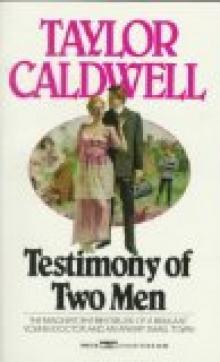 Testimony of Two Men
Testimony of Two Men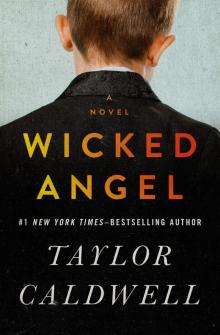 Wicked Angel
Wicked Angel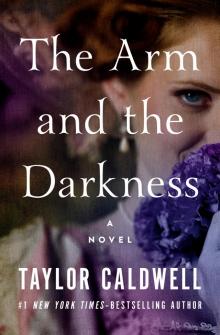 The Arm and the Darkness
The Arm and the Darkness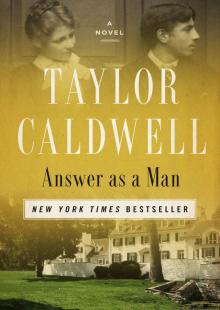 Answer as a Man
Answer as a Man Grandmother and the Priests
Grandmother and the Priests On Growing Up Tough: An Irreverent Memoir
On Growing Up Tough: An Irreverent Memoir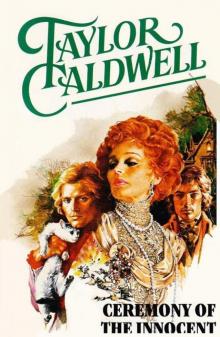 Ceremony of the Innocent
Ceremony of the Innocent The Listener
The Listener Bright Flows the River
Bright Flows the River The Earth Is the Lord's
The Earth Is the Lord's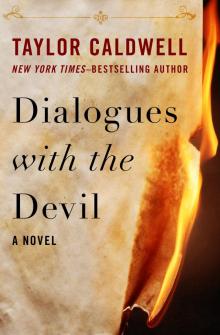 Dialogues With the Devil
Dialogues With the Devil A Tender Victory
A Tender Victory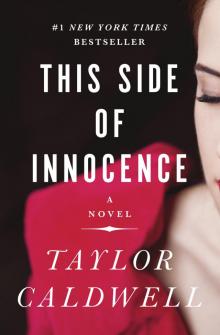 This Side of Innocence
This Side of Innocence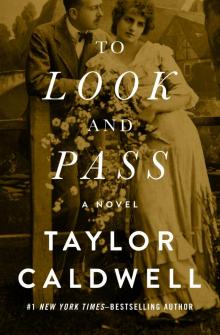 To Look and Pass
To Look and Pass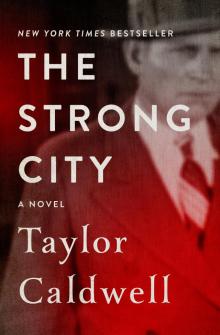 The Strong City
The Strong City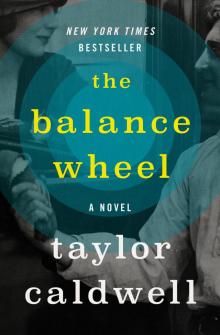 Balance Wheel
Balance Wheel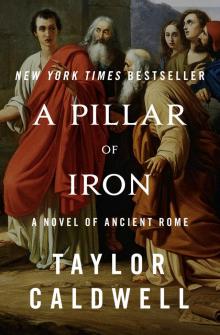 A Pillar of Iron: A Novel of Ancient Rome
A Pillar of Iron: A Novel of Ancient Rome Glory and the Lightning
Glory and the Lightning Dear and Glorious Physician
Dear and Glorious Physician The Wide House
The Wide House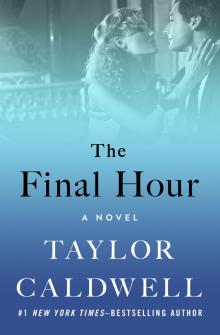 The Final Hour
The Final Hour Never Victorious, Never Defeated
Never Victorious, Never Defeated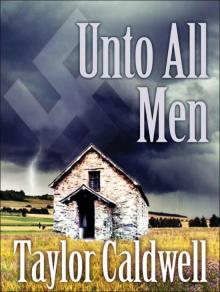 Unto All Men
Unto All Men The Turnbulls
The Turnbulls Your Sins and Mine: The Terrifying Fable of a World Without Faith
Your Sins and Mine: The Terrifying Fable of a World Without Faith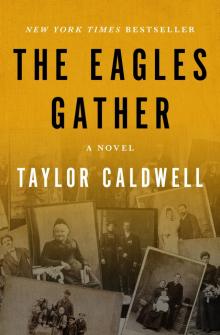 The Eagles Gather
The Eagles Gather Let Love Come Last
Let Love Come Last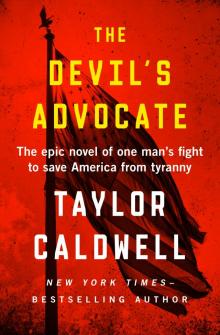 The Devil's Advocate: The Epic Novel of One Man's Fight to Save America From Tyranny
The Devil's Advocate: The Epic Novel of One Man's Fight to Save America From Tyranny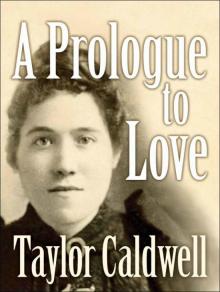 A Prologue to Love
A Prologue to Love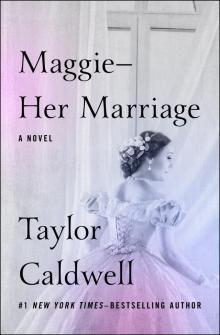 Maggie: Her Marriage
Maggie: Her Marriage The Late Clara Beame
The Late Clara Beame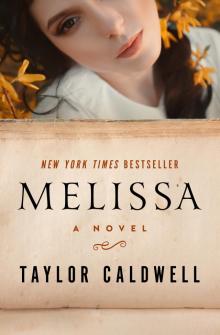 Melissa
Melissa Great Lion of God
Great Lion of God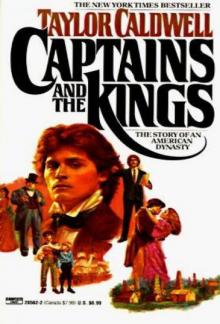 Captains and the Kings
Captains and the Kings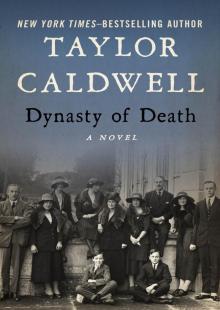 Dynasty of Death
Dynasty of Death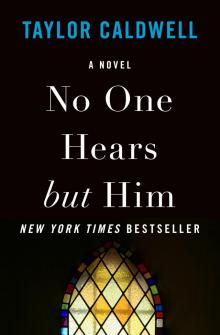 No One Hears but Him
No One Hears but Him The Sound of Thunder
The Sound of Thunder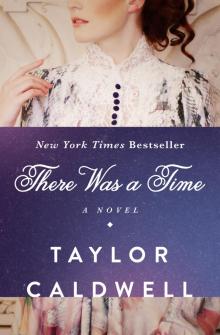 There Was a Time
There Was a Time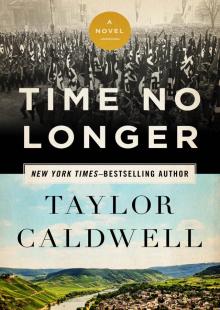 Time No Longer
Time No Longer I, Judas
I, Judas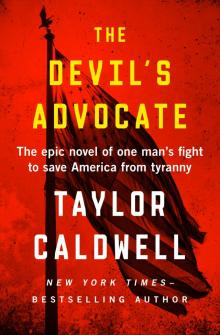 The Devil's Advocate
The Devil's Advocate The Romance of Atlantis
The Romance of Atlantis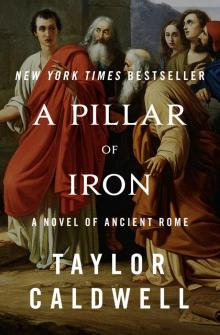 A Pillar of Iron
A Pillar of Iron On Growing Up Tough
On Growing Up Tough Your Sins and Mine
Your Sins and Mine